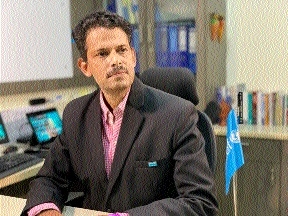‘Make sure children remain at home for next 14 days’
| Date :22-Mar-2020 |

Job Zachariah
RAIPUR ;
WITH global pandemic ‘COVID-19’ breaking all boundaries, it is essential that every organisation, which has stake in facilitating health services during a crisis situation being faced by India, gears up to accomplish the ‘mission impossible.’
UNICEF is one of the largest organisations dedicated to uphold public health especially among children. In an interview to The Hitavada News Editor Mukesh S Singh, Chief of UNICEF in Chhattisgarh, Job Zachariah, spoke at length about the necessary precautions to be taken and things to do while in quarantine with children, in the eventuality of spread of the coronavirus infection in the State.
Excerpts –
Q: What should parents do to protect children from coronavirus?
Zachariah: Parents can do four things. First, make sure that children remain at home, at least the next 14 days. Second, ensure that children wash hands with soap frequently, especially before and after taking food and after going to the toilet, playing and touching floor or dirty object or surface. Any contact with people outside the home should be restricted. Third, when children sneeze or cough, they should be taught to cover their mouth with handkerchief or tissue paper. And last, children should be asked to avoid touching their eyes, nose and mouth.
Q: What other precautions should be taken at home?
Zachariah: Clean and disinfect floor, tables, chairs, doorknobs, light switches, remotes, toilets etc, at home. Disinfect toys and other objects used by children, frequently.
Q: Should the child wear a mask to protect against coronavirus?
Zachariah: No. if the child is healthy, there is no need to wear a mask to protect against coronavirus. Only people who have symptoms like cough, fever and breathlessness need to wear a mask, to prevent transmission.
Q: Are there any vaccines to prevent and treat COVID-19 among children?
Zachariah: Unfortunately, no. There is no vaccine available to prevent or treat novel coronavirus disease. However, parents should ensure full immunisation of children. An infant below one year would need vaccination five times- at birth, 1½ month, 2½ months, 3½ months and at 9 months. This would protect children from 15 diseases and infections. Children can be immunised on VHND day, held in every village in Anganwadi centre,
once in a month. This service has not been suspended in the state due to COVID-19. Q: As children are not going to school or Anganwadi centre, what should parents do for their education?
Zachariah: Parents could read out stories to children, talk to them, engage them in simple riddles, and teach them some simple skills like cooking. Encourage children playing at home, especially in local indoor games.
Q: What can be done to reduce stress and anxiety in children due to spread of coronavirus?
Zachariah: When children see disturbing images on TV or on-line, they may believe they are in imminent danger. Parents can gauge the level of anxiety of children by talking to them and watching their body language, sleeping pattern and behaviour. Listen to the fear and anxiety of children and tell them you are available when they are worried. Parents could play with them. Screen time of
children on mobile, television and the internet should be monitored and restricted.
Q: If the mother has symptoms of fever, cough and breathlessness, should she breast-feed babies?
Zachariah: Yes. There is no evidence to show that a mother with cough and fever would transmit the infection to the child. However, she should wash her hands with soap before and after breastfeeding. Breastfeeding is considered as the best vaccine for the child against diseases. Breastfeeding prevents death, diseases and malnutrition among children. If a mother is unable to breastfeed, breastmilk could be expressed and fed to the child with a cup and/or spoon.
Q: What special food should be given to children during this period? Zachariah: Infant below six months needs only mothers’ milk for the first six months, not even a spoon of water, cow milk or honey. After six months, they could be given semi-solid food, at least 3-4 times in a day. Breastfeeding should continue up to two years of the child.